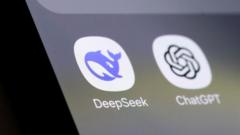DeepSeek's emergence has resulted in a significant sell-off of major American tech stocks, particularly impacting Nvidia, amidst concerns over the future of U.S. AI dominance. The startup claims to have developed its chatbot at a fraction of the cost of its U.S. peers, triggering widespread discussion and uncertainty within Silicon Valley.
China's DeepSeek AI Challenge Rattles America's Tech Landscape

China's DeepSeek AI Challenge Rattles America's Tech Landscape
In a startling turn of events, China's DeepSeek AI app is reshaping the technology sector, forcing a reevaluation of American leadership in artificial intelligence.
DeepSeek's rapid rise to the top of the App Store charts over the weekend has sent shockwaves through the tech industry, raising questions about the sustainability and competitiveness of American giants like OpenAI, whose chatbot ChatGPT has been a key player in the AI landscape.
DeepSeek's developers assert that they created their AI model for just $5.6 million, a stark contrast to the estimated $5 billion spent by OpenAI over the previous year, prompting reflections on the future of AI development. The implications for the stock market have been profound, with Nvidia reportedly losing almost $600 billion in market value, the largest drop in U.S. history, as fears mount regarding America's share in the AI race.
Market analysts are divided in their responses to DeepSeek's performance, with some expressing skepticism about its reported financials while others highlight its potential as competition. Veteran analyst Gene Munster raised red flags about the reality of DeepSeek's financial claims, hinting at possible subsidies, while also acknowledging its impressive capabilities.
The arrival of DeepSeek raises crucial questions about the sustainability of the assumptions that have underpinned America's AI dominance, particularly in the light of a recent announcement by former President Donald Trump regarding significant investments in AI infrastructure. Trump's comments about DeepSeek being a "wake-up call" suggest a pivotal moment for American tech, pushing for cheaper AI development.
The landscape of U.S. tech companies may now require a reassessment of resources and strategies as DeepSeek’s unexpected success brings new dynamics into play. DeepSeek's effectiveness, combined with its low cost, could challenge prevailing beliefs about what is necessary for successful AI development and raise important discussions about the future trajectory of the semiconductor industry, heavily dominated by companies like Nvidia. The coming months will reveal how these shifts impact the broader AI ecosystem and whether the U.S. can maintain its competitive edge in the face of this new Chinese contender.
DeepSeek's developers assert that they created their AI model for just $5.6 million, a stark contrast to the estimated $5 billion spent by OpenAI over the previous year, prompting reflections on the future of AI development. The implications for the stock market have been profound, with Nvidia reportedly losing almost $600 billion in market value, the largest drop in U.S. history, as fears mount regarding America's share in the AI race.
Market analysts are divided in their responses to DeepSeek's performance, with some expressing skepticism about its reported financials while others highlight its potential as competition. Veteran analyst Gene Munster raised red flags about the reality of DeepSeek's financial claims, hinting at possible subsidies, while also acknowledging its impressive capabilities.
The arrival of DeepSeek raises crucial questions about the sustainability of the assumptions that have underpinned America's AI dominance, particularly in the light of a recent announcement by former President Donald Trump regarding significant investments in AI infrastructure. Trump's comments about DeepSeek being a "wake-up call" suggest a pivotal moment for American tech, pushing for cheaper AI development.
The landscape of U.S. tech companies may now require a reassessment of resources and strategies as DeepSeek’s unexpected success brings new dynamics into play. DeepSeek's effectiveness, combined with its low cost, could challenge prevailing beliefs about what is necessary for successful AI development and raise important discussions about the future trajectory of the semiconductor industry, heavily dominated by companies like Nvidia. The coming months will reveal how these shifts impact the broader AI ecosystem and whether the U.S. can maintain its competitive edge in the face of this new Chinese contender.






















